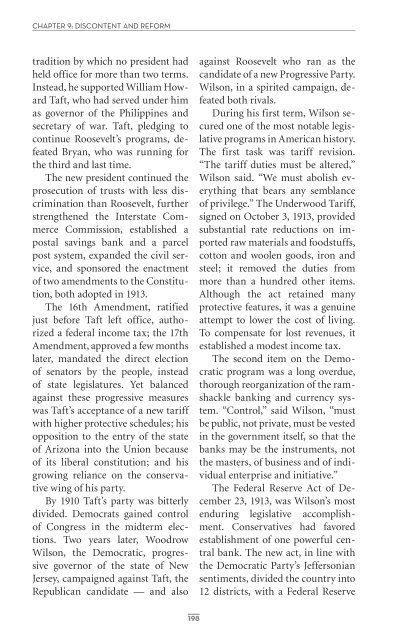s. history us history us history - Embassy of the United States
s. history us history us history - Embassy of the United States
s. history us history us history - Embassy of the United States
- No tags were found...
You also want an ePaper? Increase the reach of your titles
YUMPU automatically turns print PDFs into web optimized ePapers that Google loves.
CHAPTER 9: DISCONTENT AND REFORMOUTLINE OF U.S. HISTORYtradition by which no president hadheld <strong>of</strong>fice for more than two terms.Instead, he supported William HowardTaft, who had served under himas governor <strong>of</strong> <strong>the</strong> Philippines andsecretary <strong>of</strong> war. Taft, pledging tocontinue Roosevelt’s programs, defeatedBryan, who was running for<strong>the</strong> third and last time.The new president continued <strong>the</strong>prosecution <strong>of</strong> tr<strong>us</strong>ts with less discriminationthan Roosevelt, fur<strong>the</strong>rstreng<strong>the</strong>ned <strong>the</strong> Interstate CommerceCommission, established apostal savings bank and a parcelpost system, expanded <strong>the</strong> civil service,and sponsored <strong>the</strong> enactment<strong>of</strong> two amendments to <strong>the</strong> Constitution,both adopted in 1913.The 16th Amendment, ratifiedj<strong>us</strong>t before Taft left <strong>of</strong>fice, authorizeda federal income tax; <strong>the</strong> 17thAmendment, approved a few monthslater, mandated <strong>the</strong> direct election<strong>of</strong> senators by <strong>the</strong> people, instead<strong>of</strong> state legislatures. Yet balancedagainst <strong>the</strong>se progressive measureswas Taft’s acceptance <strong>of</strong> a new tariffwith higher protective schedules; hisopposition to <strong>the</strong> entry <strong>of</strong> <strong>the</strong> state<strong>of</strong> Arizona into <strong>the</strong> Union beca<strong>us</strong>e<strong>of</strong> its liberal constitution; and hisgrowing reliance on <strong>the</strong> conservativewing <strong>of</strong> his party.By 1910 Taft’s party was bitterlydivided. Democrats gained control<strong>of</strong> Congress in <strong>the</strong> midterm elections.Two years later, WoodrowWilson, <strong>the</strong> Democratic, progressivegovernor <strong>of</strong> <strong>the</strong> state <strong>of</strong> NewJersey, campaigned against Taft, <strong>the</strong>Republican candidate — and alsoagainst Roosevelt who ran as <strong>the</strong>candidate <strong>of</strong> a new Progressive Party.Wilson, in a spirited campaign, defeatedboth rivals.During his first term, Wilson securedone <strong>of</strong> <strong>the</strong> most notable legislativeprograms in American <strong>history</strong>.The first task was tariff revision.“The tariff duties m<strong>us</strong>t be altered,”Wilson said. “We m<strong>us</strong>t abolish everythingthat bears any semblance<strong>of</strong> privilege.” The Underwood Tariff,signed on October 3, 1913, providedsubstantial rate reductions on importedraw materials and foodstuffs,cotton and woolen goods, iron andsteel; it removed <strong>the</strong> duties frommore than a hundred o<strong>the</strong>r items.Although <strong>the</strong> act retained manyprotective features, it was a genuineattempt to lower <strong>the</strong> cost <strong>of</strong> living.To compensate for lost revenues, itestablished a modest income tax.The second item on <strong>the</strong> Democraticprogram was a long overdue,thorough reorganization <strong>of</strong> <strong>the</strong> ramshacklebanking and currency system.“Control,” said Wilson, “m<strong>us</strong>tbe public, not private, m<strong>us</strong>t be vestedin <strong>the</strong> government itself, so that <strong>the</strong>banks may be <strong>the</strong> instruments, not<strong>the</strong> masters, <strong>of</strong> b<strong>us</strong>iness and <strong>of</strong> individualenterprise and initiative.”The Federal Reserve Act <strong>of</strong> December23, 1913, was Wilson’s mostenduring legislative accomplishment.Conservatives had favoredestablishment <strong>of</strong> one powerful centralbank. The new act, in line with<strong>the</strong> Democratic Party’s Jeffersoniansentiments, divided <strong>the</strong> country into12 districts, with a Federal ReserveBank in each, all supervised by anational Federal Reserve Board withlimited authority to set interest rates.The act assured greater flexibility in<strong>the</strong> money supply and made provisionfor issuing federal-reserve notesto meet b<strong>us</strong>iness demands. Greatercentralization <strong>of</strong> <strong>the</strong> system wouldcome in <strong>the</strong> 1930s.The next important task wastr<strong>us</strong>t regulation and investigation<strong>of</strong> corporate ab<strong>us</strong>es. Congressauthorized a Federal Trade Commissionto issue orders prohibiting“unfair methods <strong>of</strong> competition”by b<strong>us</strong>iness concerns in interstatetrade. The Clayton Antitr<strong>us</strong>t Actforbade many corporate practicesthat had th<strong>us</strong> far escaped specificcondemnation: interlocking directorates,price discrimination amongpurchasers, <strong>us</strong>e <strong>of</strong> <strong>the</strong> injunction inlabor disputes, and ownership byone corporation <strong>of</strong> stock in similarenterprises.Farmers and o<strong>the</strong>r workers werenot forgotten. The Smith-Lever Act<strong>of</strong> 1914 established an “extensionsystem” <strong>of</strong> county agents to assistfarming throughout <strong>the</strong> country.Subsequent acts made credit availableto farmers at low rates <strong>of</strong> interest.The Seamen’s Act <strong>of</strong> 1915improved living and working conditionson board ships. The FederalWorkingman’s Compensation Actin 1916 authorized allowances tocivil service employees for disabilitiesincurred at work and establisheda model for private enterprise. TheAdamson Act <strong>of</strong> <strong>the</strong> same year establishedan eight-hour day for railroadlabor.This record <strong>of</strong> achievement wonWilson a firm place in American<strong>history</strong> as one <strong>of</strong> <strong>the</strong> nation’s foremostprogressive reformers. However,his domestic reputation wouldsoon be overshadowed by his recordas a wartime president who led hiscountry to victory but could nothold <strong>the</strong> support <strong>of</strong> his people for<strong>the</strong> peace that followed. 9198199












